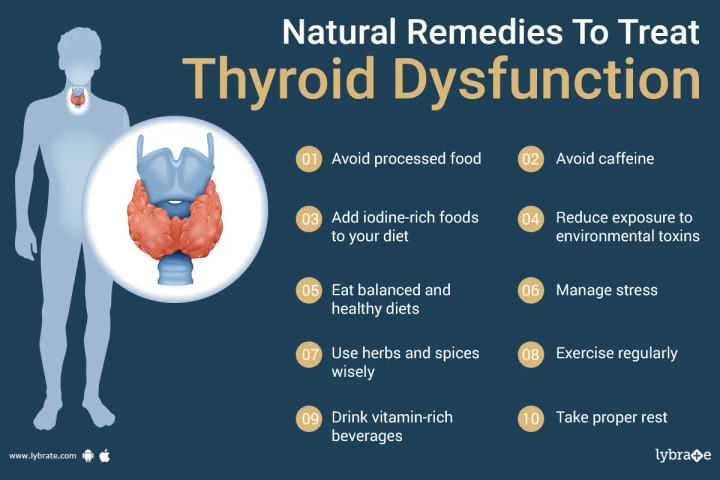10 Natural Ways To Treat Thyroid!
What is Thyroid dysfunction?
Thyroid dysfunction, also known as hypothyroidism or hyperthyroidism, is a medical condition where the thyroid gland does not produce enough thyroid hormones or produces more than the body needs.
Hypothyroidism is the most common type of thyroid dysfunction and occurs when there is too little production of thyroid hormones. Hyperthyroidism occurs when there is too much production of these hormones.
Thyroid dysfunction can be caused by both non-medical and medical factors, such as autoimmune disorders like Hashimoto's disease or lifestyle choices such as nutrition and stress levels.
Symptoms of an imbalance in these hormones may include fatigue, weight gain or loss, feeling hot or cold all the time, depression and difficulty concentrating. When left untreated it can lead to more serious health issues such as infertility and heart problems. Treatment for thyroid dysfunction typically involves either medications to help regulate hormone production or lifestyle modifications depending on the cause.
What are the signs and symptoms of Thyroid dysfunction?
The signs and symptoms of thyroid dysfunction can vary depending on whether the thyroid is producing too much or too little of its hormones.
When the thyroid produces too much – a condition called hyperthyroidism – signs and symptoms can include:
- Weight loss
- Anxiety
- Rapid heart rate
- Heat intolerance
- Sweating
- Difficulty sleeping
- Tremors in your hands and fingers
When the thyroid does not produce enough hormones – a condition called hypothyroidism – symptoms can include:
- Fatigue
- Weakness
- Weight gain
- Cold intolerance
- Dry skin or hair
- Joint pain or stiffness
What are possible complications of Thyroid dysfunction?
Thyroid dysfunction is a condition that occurs when the production of essential hormones produced by the thyroid gland is imbalanced. This can either lead to a decrease (hypothyroidism) or an increase (hyperthyroidism) in hormones released. The complications associated with thyroid dysfunction vary depending on the severity of the condition, but can include many physical and mental health issues.
- Hypothyroidism, which is an underproduction of hormones, often leads to symptoms such as fatigue, weight gain, hair loss, and constipation. It can also cause other conditions such as heart disease and infertility. Elevated levels of LDL cholesterol are common in hypothyroidism patients due to an inability to metabolise cholesterol properly. Additionally, people suffering from hypothyroidism may experience cognitive difficulties due to lower levels of oxygen reaching the brain caused by slowed metabolism.
- Hyperthyroidism is characterised by overproduction of hormones which leads to symptoms such as weight loss, increased appetite, tremors and irritability. Long-term effects can include eye problems like exophthalmos (eye bulging), osteoporosis caused by leaching calcium from bones, and congestive heart failure due impaired heart and lung function. Additionally hyperthyroidism can lead to psychological issues like anxiety disorder and depression which arise from emotional instability caused by fluctuating hormone levels inside the body.
- In some cases untreated thyroid dysfunction may even lead to coma or death if left uncontrolled for long periods without medical intervention or lifestyle changes necessary for symptom management. Careful monitoring is essential for the effective management of this condition in order to minimise or avert potential complications associated with it.
10 Natural Ways To Treat Thyroid dysfunction
- Eat foods rich in selenium: Selenium is a mineral found in seafood, eggs, sunflower seeds, Brazil nuts, and mushrooms that plays a crucial role in our health. Eating foods high in selenium can help the thyroid gland produce hormones more effectively.
- Avoid caffeine: Caffeine has been found to interfere with the absorption of thyroid hormones so reducing the amount of coffee, tea or caffeine-containing products you consume can help improve your symptoms.
- Avoid processed foods: Processed foods are often loaded with added sugars and unhealthy trans fats which can disrupt normal hormone levels and interfere with proper functioning of the thyroid gland.
- Add iodine-rich foods to your diet: Iodine is necessary for proper production of thyroid hormone so it’s important to include adequate amounts of this mineral in your diet if you suffer from thyroid symptoms like hypothyroidism or goitre. Some good sources of iodine include seaweed, navy beans, yogurt, eggs and shrimp!
- Reduce exposure to environmental toxins like bromides & perchlorates: Bromides are common pesticide found on food crops and perchlorates are also added to food as a preservative thus these toxins both act disruptors for our endocrine system disrupting things like thyroid hormone synthesis! It’s best to buy organic produce if possible and filter your drinking water if these two chemicals may be present!
- Eat a balanced and healthy diet: Ensure that your diet contains a wide array of fresh fruits, vegetables, lean proteins, nuts, seeds, and whole grains. Avoid processed or fried foods and excess sugar as these can easily disrupt your hormones.
- Manage stress: Take time to relax through yoga or meditation to reduce anxiety and stress levels associated with thyroid dysfunction.
- Exercise regularly: Regular exercise helps support the healthy functioning of the thyroid gland and hormones, so aim for at least 30 minutes per day of moderate intensity activity like walking or biking.
- Use herbs and spices wisely: Certain herbs such as ashwagandha have hormonal balancing effects on thyroid health while turmeric helps reduce inflammation associated with autoimmune conditions such as hypothyroidism
- Drink vitamin-rich beverages: Enjoy antioxidant-rich drinks to help improve overall health including green tea (great for metabolism) as well as lemon water which can assist with detoxification processes
- Get adequate rest: Sleep deprivation is one of the most overlooked culprits of poor health so ensure you’re getting enough high-quality restful sleep each night (7-9 hours).
What are the surgical treatments for Thyroid dysfunction?
Surgical treatments commonly used to treat Thyroid dysfunctions include the following:
- Total thyroidectomy: This type of surgery involves complete removal of a diseased or cancerous thyroid gland. It is usually an option for people with severe hyperthyroidism caused by Graves’ disease or for those with large goitres which have grown too large to be regulated with medications.
- Lobectomy: This type of surgery involves removing part of the affected gland, such as a lobe. It is generally used to remove tumours, cysts or other growths in one area.
- Subtotal Thyroidectomy: This type of surgery involves removing most if not all of the affected gland but leaving some remaining tissue behind in order to prevent hypothyroidism after the procedure.
- The goal of post-surgery is typically to maintain normal hormone levels while avoiding complications related to hypothyroidism, such as fatigue and weight gain.
Best doctors to consult for Thyroid dysfunction?
- Endocrinologists are the best doctors to consult for thyroid dysfunction. They specialise in treating problems of the endocrine system, including disorders of the thyroid gland.
- Primary Care Physicians are also a good option if you have thyroid dysfunction as they can diagnose and treat common thyroid problems like hypothyroidism and hyperthyroidism.
- Other specialists, like nutritionists and psychiatrists, can help if you experience depression or other mental health issues associated with your thyroid disorder.
- Depending on your individual case, it may also be beneficial to work with an integrative or complementary medicine practitioner to supplement traditional treatments for a more holistic approach to managing your condition



+1.svg)
